Tagged: Community
In My Community: the CEO Sleepout + why it matters to me
- by Alyson Shane
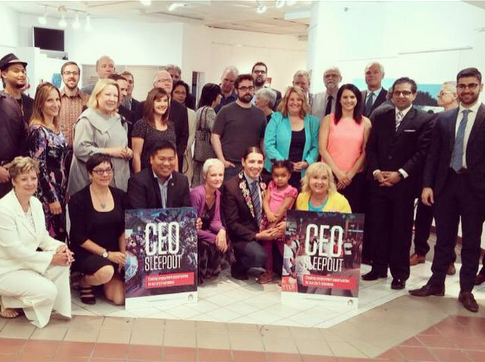
Yesterday I attended the press release for the 5th annual CEO Sleepout, organized by the Downtown Winnipeg BIZ.
The CEO Sleepout, which is in it's fifth year, aims to create employment opportunities for Winnipeg's homeless community, and to create dialogues among over 150 CEOs, community leaders, and media about our role in addressing and eliminating homelessness in our city. In the past four years the Sleepout has raised over $600,000 from the private sector, which has helped employ nearly 137 people experiencing homelessness for more than 51,000 hours of employment - with many of them returning to school or finding permanent full-time work.
On September 24th members of Winnipeg's business community (myself included) will spend a night on the streets at Portage & Main, discussing issues and possible solutions to end homelessness, touring downtown with individuals who have experienced homelessness to hear about their personal stories, and spending a night outside to experience a small taste of what it's like to be homeless in Winnipeg.
I'm really excited to be participating, and helping to raise money and awareness for this amazing cause.
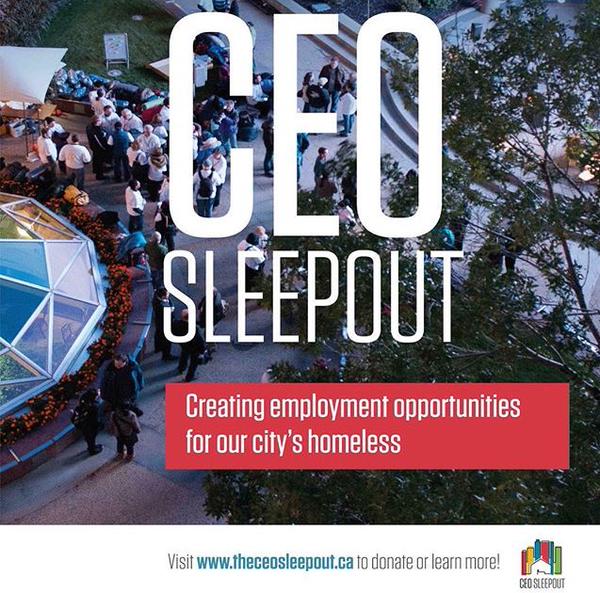
I grew up being quite sheltered. My parents moved me to a suburb called Riverbend when I was a kid, and with downtown a solid 45-minute bus ride away, I didn't spend a lot of time in our downtown core as a young person. I'm pretty embarrassed to admit this, but the first time I spent any time in the Exchange District was at 18, and I spent the entire time gripped with fear that a homeless person would accost me and take all my stuff.
Part of the problem of growing up in a suburb is that you develop a very "us vs them" mentality about your own neighbourhood versus the downtown of your city. In Winnipeg, at least, many of our young people (myself included) grow up holding extremely prejudiced and narrow-minded views about homelessness, Aboriginal issues, and individuals experiencing poverty. We don't see the issues that plague people experiencing poverty and homelessness as something that we need to address because we can simply hop in our cars and drive back to our sprawling suburbs, ignoring the problem completely.
I'm fortunate that I grew out of this phase in my thinking. When I moved out of Riverbend I lived in Osborne Village for a year, and then to West Broadway in order to be closer to school (I attended the University of Winnipeg, where the entire campus is located downtown.) West Broadway is one of the poorest neighbourhoods in the country, and living in a mixed-use and mixed-income neighbourhood, and attending a school like the University of Winnipeg which encouraged discussion about the specific challenges that Winnipeg faces in terms of public discourse and action to combat homelessness, was an eye-opening experience.
I started to see Winnipeg, and the people in it, as my responsibility. Living downtown and getting involved gave me a sense of community that I'd never felt while living in Riverbend; suddenly I wanted to see my city thrive and succeed because it meant that everyone -not just me- would get to benefit from it's success. A rising tide lifts all boats, as the old saying goes.
I was lucky: I experienced a specific set of circumstances which allowed me to develop beyond the close-minded views I had been raised with. However, many people in Winnipeg (and elsewhere) still consider homelessness and other socio-economic issues to be something that simply "isn't their problem."
That's why I decided to get involved with the CEO Sleepout. I want to raise awareness about an issue that concerns all of us, whether we live in Riverbend, Wolseley, St. Boniface or Transcona. Everyone in Winnipeg has a responsibility to do our best to make our city a better place to live - for ourselves, our kids, and for everyone else who calls Winnipeg 'home.'
I'll be collecting donations until the day of the event, so please give generously and consider donating your time to help out at local shelters and resource centres like Siloam Mission and RaY: Resource Assistance for Youth.
Ending homelessness won't be an easy task, but by working together and raising awareness we can start to make real change in our city. Let's do it together.
You're invited to #SocialHour, a monthly Twitter chat about community building & engagement
- by Alyson Shane
Hello everyone!
I'm excited to announce that starting August 11, 2015 I'll be hosting a monthly Twitter Chat called #SocialHour. On the 2nd Tuesday each month we'll have a chance to come together and discuss ideas, challenges, and strategies for growing your audience and increasing engagement on your blog and social media feeds.
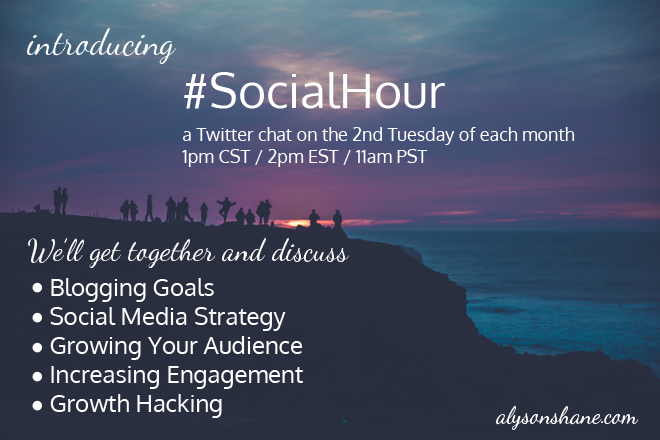
As you know, I'm a big believer in knowledge sharing, and I can't think of a better way for us all to learn and grow together than to make a time to have a chat each month about our challenges, our goals and how we plan to kick some ass that month.
Finding and growing your community can feel overwhelming by yourself, so let's do it together!
How can you join us?
Joining the conversation is easy, all you need is a Twitter account!
Once you're logged in you can follow the discussion by doing a Twitter search for the hashtag #SocialHour. If you get lost just hit up my Twitter account to find the hashtag link again and you'll be right back in the mix.
I'll prepare a handful of questions each month to get the wheels in your head turning and the conversation started, and we'll spent the next hour or so sharing our responses with each other and collaborating together.
I'll be posting questions with Q1, Q2, etc at the beginning, so you can easily keep track of what we're discussing. When you respond, simply add the corresponding number to your answer like so:
A2 My favourite cupcake is red velvet with cream cheese frosting #SocialHour
(great, now I want a cupcake - but you get the drift!)
But don't just reply to my questions, be sure to check out what other people are saying and reply to them as well! I'll also be retweeting some of my favourite contributions, and will help guide the conversation by engaging with everyone as we chat.
Sounds great! What now?
Remember to mark your calendars for August 11th at 1pm CT to join us. I'll be sending out a reminder the day before to my newsletter subscribers, so make sure to sign up so you don't miss out!
I can't wait to start this new project with all of you, and am looking forward to getting to know all of you and helping you find and grow kickass, engaged communities!
xox
Alyson
Supporting My Community: MBCouldBe and Pride 2015
- by Alyson Shane
Somehow on a random Wednesday I found myself wide awake at 5am. As I was lying in bed cuddling Toulouse and listening to John snore softly (it's adorable, seriously) I started thinking about community, how important it is to make the time to make your values known, and to support causes that you believe in.
This past weekend I volunteered at #MBCouldBe, a policy summit put on by Manitoba Forward. I volunteered with John and Luke Jacob, and we spent the day listening to various speakers and panel discussions and tweeting from the Manitoba Forward twitter account (as well as our own, of course).
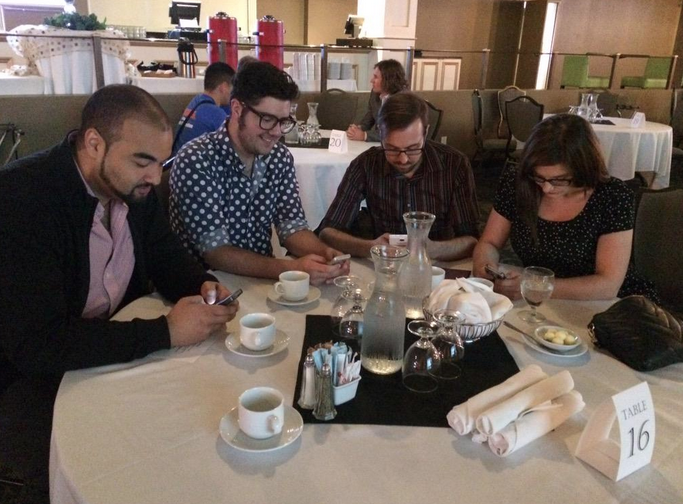
(All of us setting up for a busy day of Tweeting.)
When I arrived I wasn't sure to expect; what sorts of people would be there? What would their views be? Was I just walking into a giant, one-sided political discussion?
What I found surprised me: I met a diverse group of individuals and speakers who were all interested in actively discussing ("actively" is putting it lightly in some cases) the ways in which Manitoba could work towards being a more successful and vibrant province. I was impressed at the variety of speakers at the event: some were obviously very centre-right, some much more liberal in their views, and the discussion that took place was positive and informative.
What impressed me the most, though, was the sheer amount of people that came out on a warm June afternoon on a Saturday, while events like Jazz Fest were going on and patios were abound, to sit in an event centre and discuss Manitoba's future.
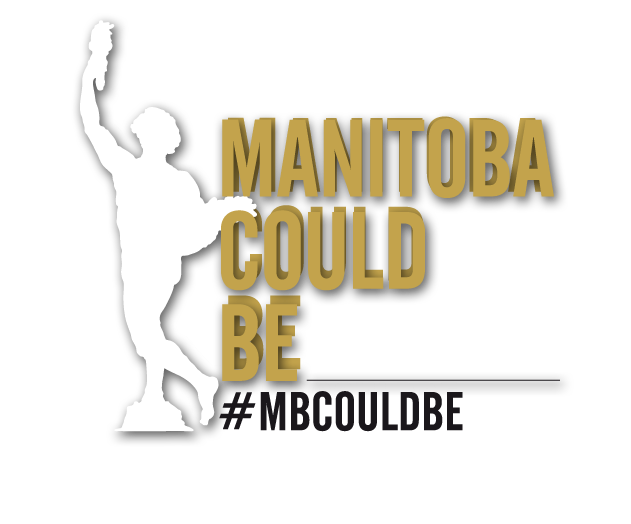
This was important to me for several reasons, the largest of which is that as a Manitoban I was raised with a very healthy sense of self-deprecation, which I've written about before. Manitobans can be snarky and we can be cynical, especially about our own hometown and our province. We're raised with the belief that Winnipeg, and Manitoba on a larger scale, simply isn't worth the energy. Why put time into improving our local economy or starting a small business here when we can just run off to Toronto, Montreal, or Vancouver?
I used to have that mindset. Not so long ago I was dead-set on moving to Toronto, where I have some family. I was going to leave Winnipeg in my dust and make it big in Ontario. Then something changed: I took a class at the University of Winnipeg called (appropriately enough) "The History of Winnipeg" which completely changed my views.
When I started spending time getting to know the complexities of the city and the province where I grew up, I started to develop a deeper understanding of why our issues were unique, and for the rich, beautiful history we have here and the strong, creative, interesting people decide to spend their lives here. I fell head-over-heels with Winnipeg, and decided that I wanted to stay and invest my time, my business and my life to helping make it a better place.
Many Manitobans still have that negative mindset, unfortunately, but among the people that I spoke to and who participated at #MBCouldBe I didn't hear a single dissenting voice. Instead I heard a ton of local pride, and even when we discussed ways in which we could be better, it was always with hope and with a fierce sense of dedication to making Manitoba an even better place to work and to live.
--
Another way I experienced local pride this weekend was the following day, when I marched in the 2015 Pride Parade. New Media Manitoba sponsored a banner in the Pride Parade and I tweeted about it and marched with my friends in support of the LGBT community.
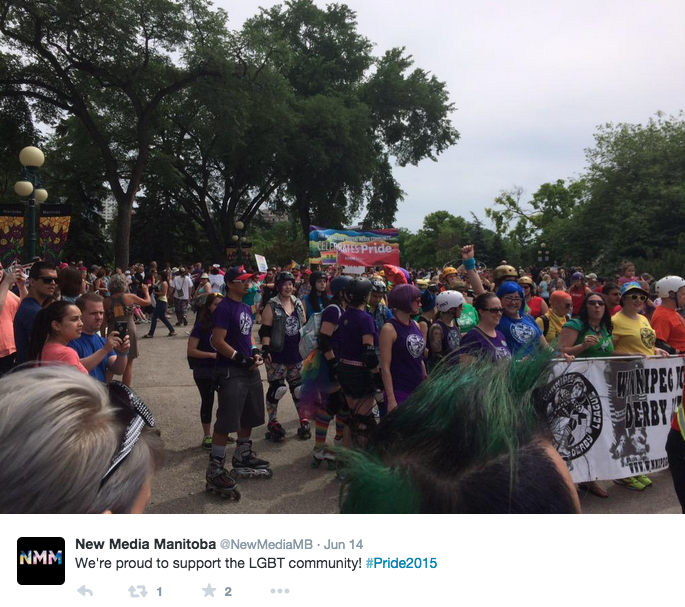
There were over a thousand people who showed up in costume and with banners and floats, and the outpouring of love and support for the LGBT community is what makes Pride one of my favourite annual events - I've been going since I was allowed to start taking the bus downtown from the suburbs where I grew up.
Someone once said to me "we march in the Pride Parade so that one day we don't need one." As in, by raising awareness and support got the LGBT community with the parade, eventually they hope that society will become accepting of those individuals to the point where a parade is no longer necessary. The whole point of the annual Pride week is to mobilize support for the LGBT community and to show people that there are people who support the rights and freedoms of others to express themselves and to be who they are, regardless of what (if any) gender they identify with.
--
This morning, while watching the dawn creep into my bedroom it struck me that half of showing your support is simply showing up. It's very easy to play Armchair Activist (and we all do, to some extent) but by taking the time out of our daily lives to physically show up and show support for our local communities -be they political, social, sexual, whatever- we help make the world a better place because we add our voices and our bodies to causes that matter to us.
I spent my past weekend, almost in it's entirety, lending my time and my energy to causes that I believe in and it felt amazing. It was a terrific reminder that, really, all we need to do to start making our communities a better place is show up and get involved.
Have you attended any local events in your community lately? What were they for? I'd love to hear about them!
The Case for Knowledge Sharing
- by Alyson Shane
The other week I attended the Winnipeg Game Jam, a weekend-long event where local developers, artists and the like got together to spend a furious weekend creating an indie game together. Mostly they worked in teams, but there were also a lot of people who walked around and offered to help other teams when they had some downtime, which I thought was really interesting.
The more I thought about it, the more I felt that what I saw at the game jam was representative of the type of positive, collaborative spirit that I've discovered in Winnipeg. I frequently get the sense that "we're all in this together," and that we're all working towards common, shared goals of lifting each other up and working together towards success.

In the short time I've been involved in our community I've learned a deep appreciation for sharing knowledge and collaboration through attending events like the Winnipeg Game Jam, and with that in mind I'd like to discuss why I think sharing knowledge, experiences and resources is something that we should all strive to do.
Why should we share what we know?
First things first: I wouldn't be doing what I do without the guidance, advice and knowledge of dozens of people who happily shared it with me - over a coffee, over a glass of wine, whatever. The fact that I've been able to meet tons of helpful, knowledgeable people who have been giving with their time has allowed me to grow my business and, in turn, start helping others grow theirs as well.
As a result of these experiences and the help I've had, I've come to believe that knowledge is a powerful tool to have in your arsenal, and considering information economy in which we live, I'd argue that knowledge is more powerful when you share it than when you keep it to yourself.
Here are a few reasons why I think it's good practice to share what you know:
Sharing knowledge makes you a thought leader & an expert in your field
This is something that I've had to repeat to several of my clients who have been wary of posting blog content or articles which they fear will give their competition an advantage. Spoiler alert! Anything you know can be found with a quick Google search... but that isn't the point. By being open and giving with your knowledge people will have a greater respect for you - not just because you know what you know, but that you have the ability to articulate it and the desire to share it with others and help them.
Let's use Paul Graham as an example. For those of you not familiar with his work, Paul Graham is a programmer, venture capitalist and essayist (whose essays you should definitely read) who developed Viaweb, the first application service provider (ASP) which eventually got bought out by Yahoo! and allowed Paul to go on to found YCombinator, one of the most well-known and respected seed funds in the world.
Do thousands of entrepreneurs and businesspeople who apply to YCombinator think less of Paul Graham because he gives away his knowledge for free in essays and in meetings? Of course not. They eat up his words and try to apply his insight to their own lives and challenges, and when he speaks, they listen.
This is because people don't come to you just for your knowledge; they come to you for the judgments that you make based on that knowledge.
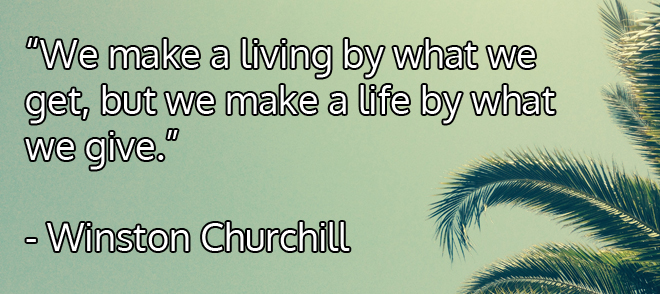
Sharing knowledge builds relationships
I've had a variety of coffees and hang-outs with local content-marketing types like myself where we've chatted about our various projects, struggles we're having, and how we can provide better service for our clients. I've received advice and doled it out in kind - but what's important in those interactions is that we've moved from being internet strangers to real-life acquaintances (in fact, if we're lucky maybe we can even level up to being friends, who knows?)
Everything in life is about who you know. This applies to both online and offline relationships, and if you position yourself as someone who isn't willing to take the time to help other people then it's very likely that, in turn, people won't take the time to help you.
Especially in this digital age, the more people you know and develop healthy, positive relationships with the better off you'll be. Gone are the days of lone-wolfing it and trying to alienate everyone for fear that they might use your knowledge against you; by surrounding yourself with a vibrant community and constantly working at growing your network by sharing what you know and helping one another you set yourself (and everyone you help!) up for future success.
Sharing knowledge can change the world
By working together and sharing ideas, information and experience we can make really great things happen.
Case in point: open source software. The PHP language, which powers about 60% of websites, or Wordpress, which powers about 30% are both, open-source. Huge, world-changing websites like Facebook wouldn't exist without open-source tools like PHP and MySQL. Linux, which is the open source code behind Android, powers most of the phones on the market today, and it's creator, Linus Tovald also created an open source tool called Git, which has changed the way that millions of developers work and build collaboratively.
Open source is my favourite example of the benefits of knowledge-sharing and collaboration because it hasn't resulted in mass unemployment or people losing their job prospects because they taught someone else what they knew. In fact, it's only strengthened the developer community and allowed them to make amazing things together.
Why does this matter?
It matters because the world is rapidly changing, and having a mindset of scarcity is something that, collectively, we're moving away from. People are starting to realize that there is in fact room for everyone to be successful, and by lifting each other up we all benefit from it.
I've seen it firsthand at events like the Winnipeg Game Jam, and at local events held by groups like RampUp Manitoba, Skullspace, New Media Manitoba and AssentWorks (to use a few local examples). By sharing knowledge and resources our communities are growing and flourishing, and by helping other people we become more powerful, ourselves. Giving away knowledge doesn't diminish how much of it you have, and we all benefit from a community of people (in whatever profession) who are willing to contribute and make that community the best that it can be.
Why you should share:
Know what the best part in all of this is? Helping people feels good. The feeling that you get when you do someone a favour, introduce them to someone who helps launch their career, or even give them a hand in navigating a sticky situation is so rewarding, and that person will remember you for what you did for them and will be more than willing to help you in the future.
Sure, there are exceptions to this rule -some people are just jerks- but going around assuming that everyone is trying to screw you over or waste your time is a pretty sad and lonely way to go through life, and pretty much guarantees that nobody will want to work with you once your true colours show through (and believe me, they always do).
The world is changing. Like I said at the beginning of this post: we live in an information economy, and knowledge is power - especially when you have a lot of it and share it readily. When you take the time to share what you know with people it guarantees that you will be successful in your endeavours because people will want to work with you and help you. It also guarantees that you will be more respected by your peers, more well-liked, and that you'll be a happier person overall because (and this is really the most important part, at the end of the day.)
What is the most important piece of knowledge that someone had given you? I'd love to know!
